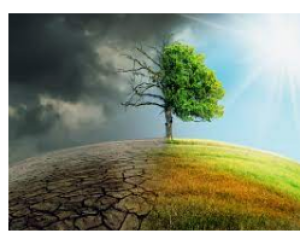Climate change
Climate Change is Happening Now
The Earth is becoming rapidly warmer. Twelve of the 13 hottest years on record have occurred since 1995. The vast majority of the world's leading climate experts attribute this warming mainly to a build-up of ‘greenhouse' gases (GHG) emitted by human activities, in particular the burning of fossil fuels — coal, oil and gas — and the destruction of forests. Greenhouse gases are so called because they trap the sun's heat in the atmosphere in the same way as the glass of a greenhouse. This man-made warming is causing discernible climatic and environmental changes, such as more frequent extremes of weather, rising sea levels, and melting glaciers and polar ice. In the longer term these changes threaten to cause serious damage to our economies and the environment we depend on, putting the lives of millions of people in danger and causing the extinction of animal and plant species. The 27 EU member countries are responsible for around 14% of world GHG emissions. More than 80% of EU emissions come from the production and use of energy and from transport.
There is considerable scientific evidence that the risk of irreversible and possibly catastrophic environmental changes, such as unstoppable melting of polar land ice or Arctic tundra, will greatly increase if global warming reaches 2° C or more above the pre-industrial temperature (equivalent to around 1.2°C above today's level). By 2005 the average global temperature was 0.76° C above the preindustrial level, according to the UN Intergovernmental Panel on Climate Change (IPCC), which brings together the world's leading climatologists. And the IPCC projects further global warming of 1.8°-4° C this century, and in the worst case as much as 6.4° C, unless the international community acts to cut GHG emissions. The European Union's position is that the international community must take urgent and strong action to prevent global warming from reaching 2° C. This is both technologically feasible and economically affordable, with the cost estimated at around 1% of global GDP. This is far less than letting climate change take its destructive course, which is expected to cost at least 5% of global GDP and could reach 20% or more in the long term — with an economic impact equivalent to the world wars of the 20th century.
Two major international agreements have been adopted to address climate change: the 1992 UN Framework Convention on Climate Change (UNFCCC) and the 1997 Kyoto Protocol. Both are based on the principle that industrialised countries should take the lead in combating climate change since they are responsible for the bulk of emissions since the Industrial Revolution and have greater financial resources. The UNFCCC, which has been ratified by 191 countries plus the European Community, establishes a framework for international cooperation on climate change with the ultimate objective of preventing dangerous man-made interference with the climate system. [...]
From EU Publications Office April 2009
publications.europa.eu

